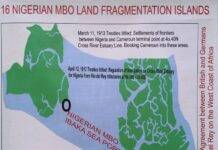Collage photo of Prof. Charles Soludo, Governor, Anambra State and the Inspector General of Police, IGP Alkali Baba.
▪ Anambra State Governor’s security vehicle breaks down
▪ Company petitions NPF, NMDPRA, FCCPC over sales of adulterated diesel by JEZCO Oil Nigeria Limited
Abasifreke Effiong, Awka.
Efforts by the Nigerian security forces in Anambra State fighting to curtail insecurity in South-Eastern Nigeria caused by the activities of secessionist group – Indigenous People of Biafra (IPOB)- are being hindered by frequent breakdown of their armoured personnel carriers (APCs) caused by off-spec (adulterated) diesel otherwise called automotive gas oil (AGO).
An on-going investigation by The Dune which involves collection of samples of AGO, laboratory testing and analyses of the product quality inline with the specifications set by the Nigerian Midstream and Downstream Petroleum Regulatory Authority, NMDPRA and Standards Organisation of Nigeria, revealed that a major petroleum marketer in Anambra state was selling off-spec diesel to the public.
Off-spec is a technical term used in the petroleum industry to refer to a product that does not meet quality standard or specification set by law.
Anambra is one of the five south-eastern states in Nigeria where the proscribed secessionist group, Indigenous People of Biafra (IPOB) and its armed wing, Eastern Security Network (ESN) have killed hundreds of civilians and scores of security personnel, in a struggle for control and self-identity.
Even though joint security operations have tamed insecurity in the State capital and major urban areas, the State has remained a high-risk area in the region since August 2021 when IPOB declared Monday of every week as “ghost Monday”. The pro-Biafran group is enforcing a compulsory sit-at-home since the incarceration of their leader, Mazi Nnamdi Kanu, by the Nigerian government.
The police and joint security teams working in Ekwuolobia, a commercial town in Aguata local government area where the secessionist’s militia once attacked security men using improvised explosive devices (IEDs) do not have functional armoured personnel carrier.
Our investigation has revealed that at least nine Spartan model, Light Armoured Vehicles (LAV), FORD-350 superduty,6.4L Ford American turbodiesel engine with electronic transmission used by Nigerian security forces in Anambra have broken down in the past eight months at different locations where the joint security troops and special forces are carrying out operations to protect communities from violent attacks by the secessionist’s armed group, ESN.
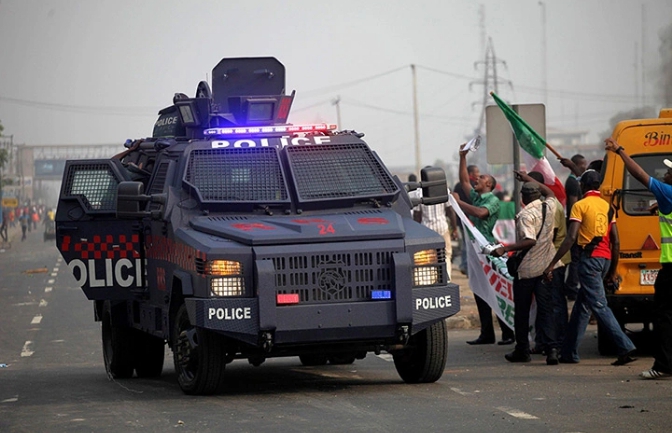 The Spartan model, Light Armoured Vehicle (LAV) use by the Nigerian Police.
The Spartan model, Light Armoured Vehicle (LAV) use by the Nigerian Police.
Our sources confirmed that suspected off-spec diesel has damaged the transmission system in the LAVs deployed by the Nigerian police to Area Command Ihiala; police division, Isuofia; Rapid Response Squad office, Awkuzu; Governor’s convoy; and the Anambra State Government House.
The Spartan armoured troop-carrier runs on a fully electronic transmission system which has very less or no resistance to off-spec gas oil, a security auto mechanic who is familiar with vehicle said.
Some of the police LAVs in the State running on a manual transmission system have been affected by the off-spec diesel too, one of our sources who pleaded anonymity disclosed.
“The ones with manual injector are also affected. Those ones have not completely broken down like the ones with electric engines, but they have developed hard-starting. We usually prime it with petrol before it will start.”
Despite claim by the Nigerian Midstream and Downstream Petroleum Regulatory Authority, NMDPRA, that it has been “going round everyday” to check petroleum product quality in the State, off-spec diesel is still sold in fuel stations.
Off-spec diesel damages mostly the pressure pump and nozzle of the FORD engine, rendering the APC immovable and un-useful.
Security personnel in the State are risking their lives patrolling in high-risk areas with soft body vehicles.
PREVIOUS INVESTIGATIONS: • UPDATED: Akwa Ibom Governor, other officials in multi-billion naira scandal
• Uyo to Calabar : Dangerous on land, convenient on sea
A personnel attached to one of the troops said, “we are risking our lives patrolling with soft body vehicles because the APC is immovable. Without the armoured personnel carrier, we are in danger. For instance, our colleagues who were attacked with improvised explosive devices at Ekwulobia during the #EndSARS protest would have lost their lives but not for the APC.”
▪ Armoured Personnel Carriers used by Nigerian Police
The Nigerian Police are using mostly the Spartan Mk ll and Cougar Mk ll Light Armoured Vehicle (LAV) manufactured by Streit Group, for counter-terrorism and other operations.
Streit Group, one of the world’s largest armouring company founded in 1996, manufactures different models and ranges of armoured vehicles including Typhoon, Spartan, Cougar, among others. The company has offices in the Middle East, the United States, Canada and Russia. It has the world’s largest armouring facility built on a 1.5 million square feet site in the United Arab Emirates, U.A.E.
According to Defence Web, Africa’s leading defence news portal, Nigerian military has bought over 177 armoured personnel vehicles of different models from Streit Group’s facility in the U.A.E between 2016 to date.
The Nigerian police are using different range of the Spartan model Light Armoured Vehicle produced by the company. Spartan is a new generation LAV which can be configured in various models to support different range military, counter-terrorism, command and control, patrol, convoy support, and other operations. According to the vehicle technical data sheet published on www.armyrecognition.com , the vehicle is a V8 turbodiesel engine coupled on a FORD automatic transmission system. The V8-6.7L engine can run a maximum speed of 110 km/hr with a maximum cruising of 800 km and can carry up to 12 personnel.
However, the LAVs damaged by off-spec diesel in Anambra are the Spartan V8-6.4L FORD American turbodiesel engine with FORD-350 automatic transmission system.
▪ Anambra State Governor’s security vehicle breaks down
On Friday, 30th December 2022, the police APC attached as convoy support to the Anambra State Governor, Prof Charles Soludo, broke down along Amawbia road, Awka South local government area, after buying diesel at JEZCO ultramodern mega service station near the Amawbia bypass in Awka.
Our findings revealed that the vehicle broke down about 10 days after the Anambra state government spent millions of Naira to fix a new pressure pump and nozzle in it. The pressure pump and nozzle had previously flashed because of off-spec diesel. It was the third time the said APC refuelled after the parts were fixed.
When the vehicle broke down, the driver confronted management of the fuel station and accused them of selling bad diesel, an allegation the management of the station denied insisting that the diesel bought at their station must have been contaminated by another gas oil that was already in the vehicle.
NEWS:
• CSO condemns Okowa’s fresh N120bn loan
• INEC is not contemplating adjustment to election timetable – Chairman
During the confrontation between the driver and management of the station, the driver said the vehicle was driving optimally until after he refuelled at the station. The affected police APC with registration number NPF 4919 C was later towed to the frontage of the governor’s lodge at Nibo road, Amawbia, where it has been laying un-functional.
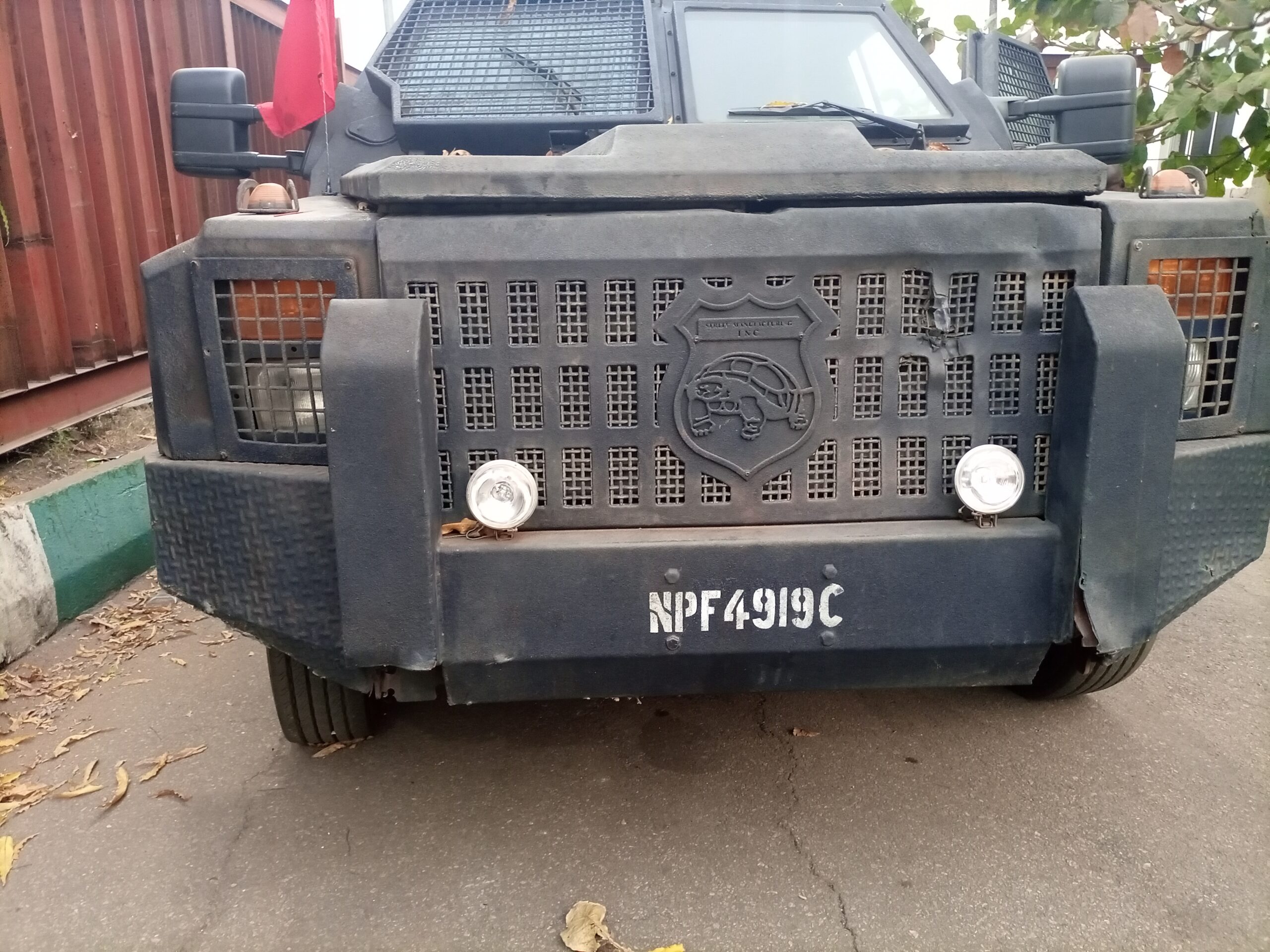 Armoured Personnel Carrier attached to Anambra State Governor’s convoy which was damaged by suspected off-spec diesel.
Armoured Personnel Carrier attached to Anambra State Governor’s convoy which was damaged by suspected off-spec diesel.
The Dune learnt that spare parts of the vehicle are not sold in open market, they are usually imported from either Canada or U.S.A, with approval of the Inspector General of Police.
▪ Collection of sample for test
Prompted by the instant case of the break down of the police armoured personnel carrier after buying diesel at JEZCO service station, this reporter launched an investigation to find out if the quality of diesel sold at the station was within NMDPRA/SON specification.
JEZCO ultramodern service station at Amawbia bypass, Awka, Awka South local government area, Anambra state which was commissioned in December 2020 by the former Governor of Anambra State, Mr Willie Obiano, is one of the petroleum products retail outlets owned and operated by JEZCO Oil Nigeria Limited.
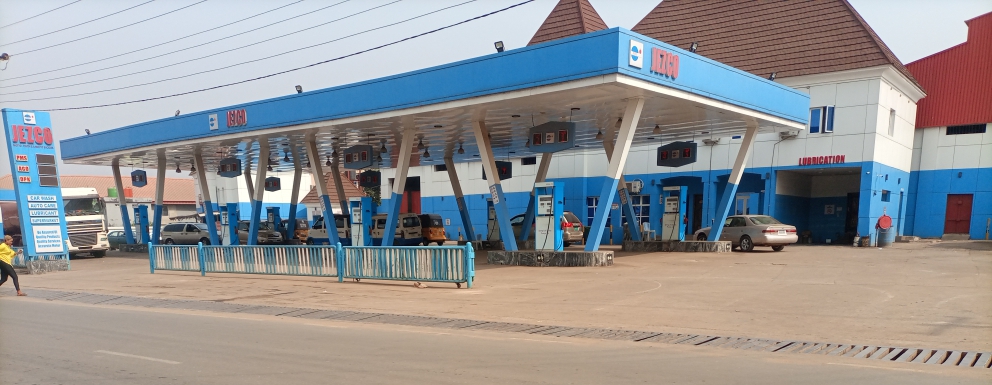 JEZCO ultramodern mega service station, Amawbia, Awka, Anambra State. (Credit: Abasifreke Effiong).
JEZCO ultramodern mega service station, Amawbia, Awka, Anambra State. (Credit: Abasifreke Effiong).
A public search on the website of the Corporate Affairs Commission shows that JEZCO Oil Nigeria Limited, owned by a philanthropist, Chief Joseph EzeOkafor, Snr., – father to multi-billion socialite, @Jowi Zaza (Joseph Eze Okafor Jnr.), famous for flaunting exotic cars on instagram, a social media platform – was registered in September 1991 with company number 174955. The company sells petrol, diesel, kerosene, and engine oil, and also deals on medical and industrial gas and manufacturing of lubricants and plastics.
JEZCO “is a big player in the industry.” Some players in the industry have said that the company owns a private depot somewhere. This could not be independently verified by The Dune.
However, the company is one of the top-rated petroleum marketers in Anambra State and its ultramodern mega service station at Amawbia bypass enjoys enormous patronage from commuters because of its prompt services. The station has eight pumps with 16 nozzles dispensing premium motor spirit (PMS), two pumps with four nozzles for automotive gas oil (AGO) and a pump with two nozzles for household kerosine (HHK).
On Friday 6th January 2023, this reporter bought a litre of diesel at JEZCO ultramodern mega service station near the Amawbia bypass with a fresh new plastic container. The product was dispensed from the pump nozzle by an attendant working at the station. The sample was labelled with the name of the station.
VIDEO: Managing Editor, The Dune, Abasifreke Effiong, buying diesel at JEZCO ultramodern mega service station, Amawbia, Awka, Anambra State.
The next task was to search for, identify and locate a laboratory licensed and accredited by NMDPRA to conduct petroleum product quality test for diesel.
A search on the internet opened to a list of accredited laboratories found online at the Nigerian Upstream Petroleum Regulatory Commission, via https://www.nuprc.gov.ng, labelled “2021 accredited labs.”
This reporter identified three laboratories in Port Harcourt, Rivers State accredited to carry out quality monitoring for petroleum products including diesel.
One of the facilities was reached via a mobile phone number provided on its website. The facility said it will cost N75,000 to run a flashpoint and N150,000 for a full quality test on the sample of the product. The other two facilities could not be reached on telephone for a price comparison.
This reporter began a journey to Port Harcourt, Rivers state where he located Trust Inspection Services (TIS), at No. 4A, Chief Ndah street, Eliade Estate, off Second Artillery, Rumuogba, Port Harcourt, the one of the NMDPRA’s accredited laboratories in Port Harcourt zone.
At TIS, the fee for running a full quality test was slightly lesser than what the first facility sought to charge.
To ensure the integrity of the sample, this reporter took the sample personally to the laboratory for the test and witnessed how the tests were done.
▪ Laboratory test shows diesel dispensed by JEZCO station at Amawbia bypass was off-spec
Laboratory test conducted on diesel sold at JEZCO service station owned by the Anambra- born oil magnet and philanthropist, Chief Joseph EzeOkafor, Snr., shows that the product was off-spec. The product did not meet NMDPRA/SON specification when subjected to flashpoint test. Flashpoint is the lowest temperature that a product can burst into flames when fire is introduced.
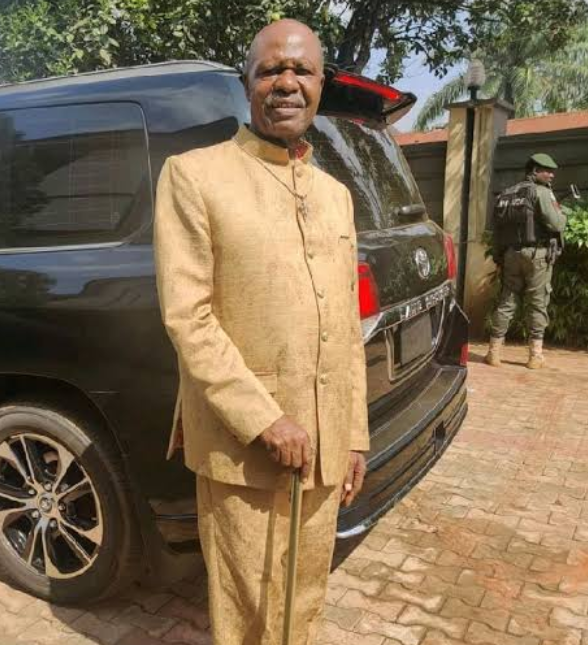 Chief Joseph EzeOkafor, Snr., Chief Executive Officer, JESCO Oil Nigeria Limited. (Credit: LinkedIn)
Chief Joseph EzeOkafor, Snr., Chief Executive Officer, JESCO Oil Nigeria Limited. (Credit: LinkedIn)
Industry experts say that the minimum flashpoint for diesel according to NMDPRA/SON specification is 66°C (degrees centigrade). The sample procured at JEZCO service station for this investigation flashed at 28°C, opening room for suspicion that the diesel must have been contaminated by a lighter gas.
The test was conducted by Trust Inspection Services Ltd, (TIS) in its laboratory at Rumuogba, Port Harcourt, Rivers state. TIS is licensed, certified and permitted by Nigerian Upstream Petroleum Regulatory Commission (NUPRC) to operate as an oil industry service company offering laboratory services – petroleum quality monitoring.
Analysing the sample, Mr Peter Oghenekevwe, the laboratory scientist and analyst at TIS said: “The product looks very clean in physical appearance, but it is a very bad product. The minimum temperature diesel should flash according to NMDPRA specification is 66°C, but this one flashed at a room ambience of 28°C.”
“The density looks good. If it was low, I would have suspected poor refining. This one has a high density of 0.85. I suspect contamination, contamination with PMS. I suspect the product must have come in contact with a lighter petroleum gas. That’s possibly what can make the flashpoint drop this point. When the flashpoint drops, it increases the flammability of the product.”
When asked if it was possible that NMDPRA could have certified diesel with a flashpoint of 28°C and approve it for sale to the public, Oghenekevwe’s response was in the negative.
“I don’t think NMDPRA would approve a product with that flashpoint because it is far below their specification.”
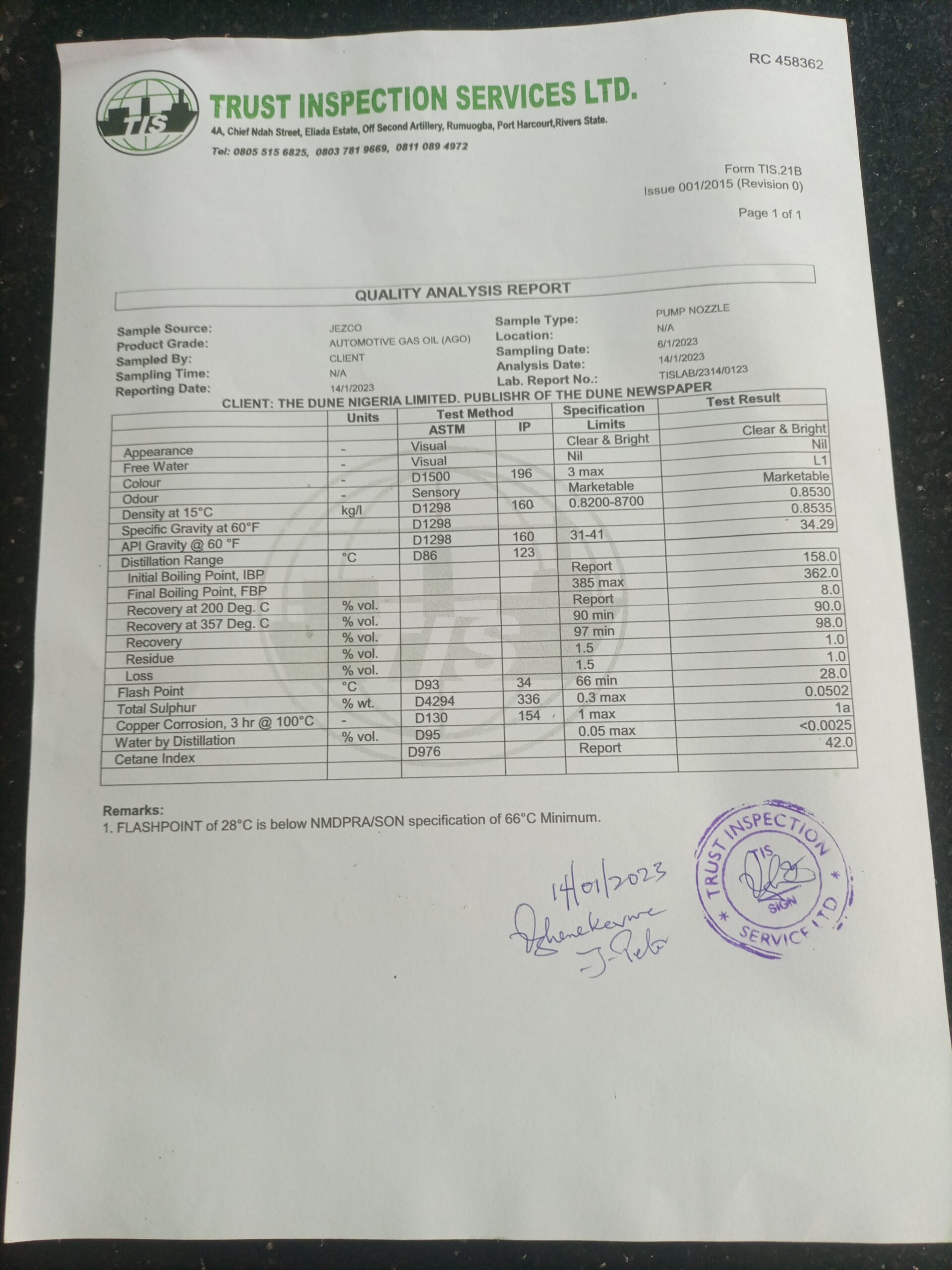 Result of laboratory test of diesel bought at JEZCO ultramodern mega service station, Amawbia, Awka.
Result of laboratory test of diesel bought at JEZCO ultramodern mega service station, Amawbia, Awka.
However, the sample passed other tests which included, appearance test, density at 15 °C, colour, odour, distillation range, sulphur, water by distillation, among others.
When contacted, the manager of JEZCO service station, Mr Emmanuel Madubugwu, said no customer has reported any case to them, insisting that the station sells the best diesel in Awka.
“How will consumers come to you without coming to where they buy (sic) the product to say what they buy (sic) from us is not good? I don’t have time for such discussion. No single customer has reported. I don’t believe what you are saying, there is nowhere you would go to a place and buy something and that thing is bad, you don’t go and report to the person.”
“We are buying our product from depot, so if there is any problem with the product no customer has reported to us. They know us as the one selling the best diesel in Awka, so I don’t where you created your office that customers will come to you to report.”
It is not true that no customer has reported suspicion of sales of off-spec diesel to the company. The driver who drove the police armoured personnel carrier that broke down after buying diesel at the station said he had confronted the company and they insisted that it was not their product that caused the break down of the APC. This was corroborated by a supervisor at the station.
When this reporter told the station manager that he bought diesel and ran a test and it turned out to be off-spec, he (the manger) retorted that he does not have time for such story and refused further comments.
“Please, please I don’t have time for your story”, he ended the discussion.
▪ Company petitions Police, NMDPRA & Consumer Protection Commission
A company engaged to repair security APCs, Sonbroson Services Limited, has petitioned the Nigeria Police Force, the Nigerian Midstream and Downstream Petroleum Regulatory Authority, NMDPRA, and the Federal Competition and Consumer Protection Commission, FCCPC in Anambra State after suspected off-spec diesel flashed the nozzle and pressure pump of the armoured personnel vehicle attached to the convoy of the Anambra State Governor.
The petition signed by Mr. Sunny Oviero, head of operations of the company stated that the reputation and integrity of the organisation who carried out maintenance and repairs of the said APC “have been impugned, and our expertise, service credibility and rating reduced before one of our very high-profile clients – His Excellency, Prof. Charles Soludo, Executive Governor of Anambra State, Anambra State Government – who sponsored the repairs of the said armoured personnel carrier. ”
“Beyond reputation damage, our company has lost money and man hour as a result of the damage caused by the off- spec diesel sold to the said APC. That our clients – His Excellency, Prof. Charles Soludo and Government of Anambra State – have suffered loses due to the damage done on the said APC by the off-spec diesel sold at JEZCO station located at the Amawbia bypass, Awka.”
▪ How high flammability in diesel can damage electric engines
High percentages of methanol in fuels are capable of lowering the energy density of the product to the point where hard-starting and stalling become issues to the vehicle engine.
In the past, there were reported cases of contamination of diesel with another petroleum product called condensate. There are also suspicions that due to high cost of diesel comparative to petrol, some greedy petroleum marketers may mix petrol to diesel to increase the quantity and sell it off as diesel at a high price. A litre of diesel is sold for N850, while the price of petrol is between N300 and N350.
The driver of the police armoured vehicle that broke down after refuelling at JEZCO station had said that the immediate damage an adulterated diesel does to an APC is to decrease the pressure of the vehicle pressure pump. The decrease in pressure will cause the nozzle to flash, leading to stalling of the engine.
The manufacturer of the Spartan model armoured personnel carrier emphasizes the use of good quality diesel. As part of its warranty caution printed boldly in three different languages on the vehicle’s fuel system pack, it is stated that “use of unapproved bio-diesel fuel may void the warranty on fuel system component.”
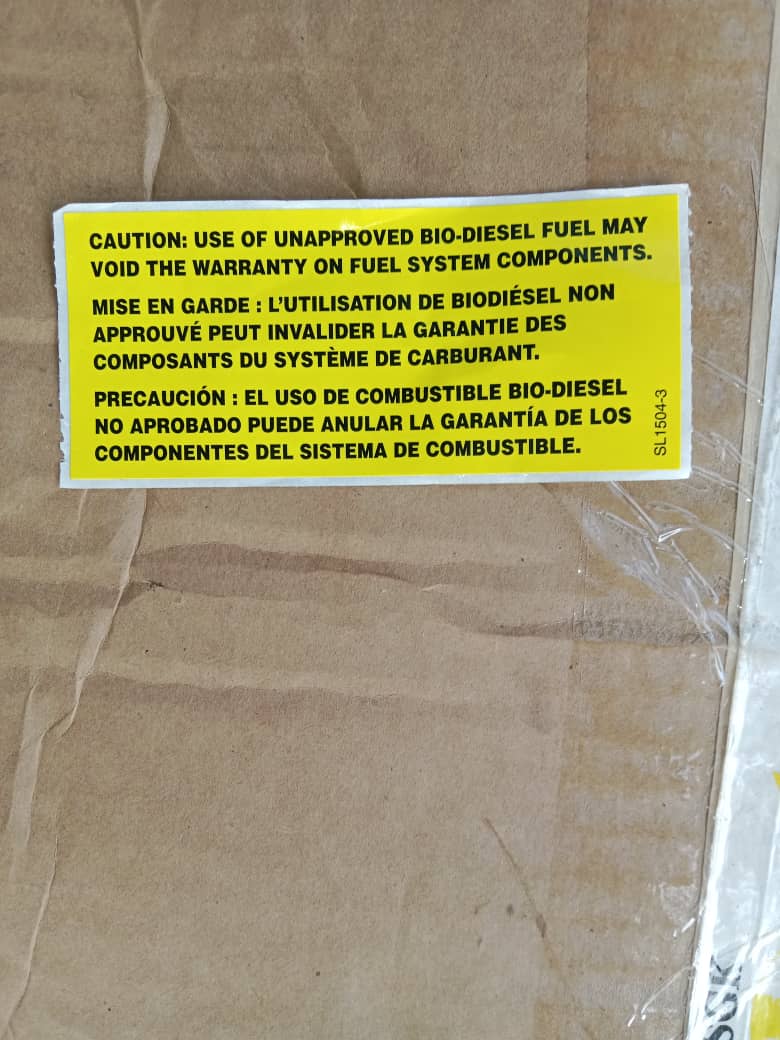 Warranty caution on the fuel component of the Armoured Personnel Carrier.
Warranty caution on the fuel component of the Armoured Personnel Carrier.
This caution by the manufacturer underscores the delicate nature of the fuel component of the vehicle and emphasizes the need to use only on-spec diesel in the vehicle.
A mechanic who repairs diesel engines and is familiar with the Spartan, F.350 6.4L engine contacted by this reporter to explain if off-spec diesel can cause sudden break down in an APC, said the engine of the armoured personnel carrier has no tolerance for poor quality diesel because it is fully electric.
“Big trucks, heavy duty machines and other hard body security vehicles using manual injector can endure adulterated diesel for a while but not the electric engine. The (electric) engine, unlike the ones with manual injector has no immunity against bad diesel, because it uses an electric pump, electric injector, electric nozzles. Everything is electric.”
“When you start an engine, what happens is that the pressure pump will pump diesel in some sort of very fast sprinkling movement to the nozzle. On the nozzle, there is a small pin that moves in and out, that is what makes the diesel burn and keeps the engine on. When the pump sprinkles diesel on the nozzle, the engine is made such that the diesel will not totally burnout before the next sprinkling. If it burns out before the next sprinkling, the nozzle pin will become dry, increasing friction and that makes the nozzle to heat up. Within few minutes the engine will go off”, the mechanic who is working for another security agency in Nigeria who did not want to be named explained.
Beyond damaging pressure pump and flashing the nozzles, diesel with flammability point higher than normal burns faster, and would cause increase in gas consumption. If the engine was designed to consume 60 liters for one mile, you will need more litres to cover that mile. This means paying more for gas.
▪ Product quality monitoring in Nigeria’s petroleum downstream sector
The Nigerian petroleum industry is highly regulated, however, the monitoring of the quality of petroleum products in the midstream and downstream sectors is not compact.
While the regulators claim to be doing so much, off-spec petroleum products are still finding its way to consumers.
In January 2022, four suppliers – MRS, Oando, Duke Oil and Emadeb/Hyde/AY Maikifi/Brittania-U consortium – imported millions of litres of off-spec premium motor spirit (petrol) which had 20 percent methanol into the country. The acceptable limit of methanol in petrol is two to three percent.
The industry regulators feigned ignorance about the off-spec product which was already in circulation across the country until consumers raised the alarm. The Nigerian Midstream and Downstream Petroleum Regulatory Authority only admitted to the presence of the unwholesome product in the market on February 8, assuring that it will work “in conjunction with NNPC Ltd., and other industry stakeholders to monitor and ensure quality petroleum products.”
Monitoring and enforcement of petroleum product quality at the consumer’s end is abysmal despite the existence of different layers of enforcement in the sector. In different states, regulators complain of insufficient resources particularly laboratory for testing products.
A major player in the petroleum sector in Akwa Ibom state, Mr Victor Etefia, who is the Senior Special Assistant on Petroleum Matters to Governor Udom Emmanuel, said consumers are apathetic to checking petroleum product quality and reporting to the authorities where a product sold is sub-standard, because of scarcity.
“Every vehicle has a specified quality of petrol fit for its engine. Here in Nigeria, we don’t pay attention to that specification. When you don’t even have the product enough on ground how would you go about looking for the one specified for your vehicle”, he said in an interaction with journalists in Uyo, amid fuel scarcity in January.
Fraudulent petroleum marketers have capitalized on consumers’ apathy to continue dispensing adulterated products to the public.
The Federal Competition and Consumer Protection Commission, an agency of government saddled with the responsibility of protecting the interest and welfare of consumers, has noted that many consumers in Nigeria are unwilling to report their experiences with products, despite regular advocacy on consumer’s right carried out by the commission.
Testing petroleum product’s quality sold to consumers at fuel stations to ascertain their quality is challenging because there are no accredited laboratories for such test in many States, and private laboratories are charging between N75,000 to N90,000 for flashpoint test, and N130,000 to N160,000 for a full quality test per sample.
There is currently no functional public accredited laboratory in the South-East. The Nigerian Midstream and Downstream Petroleum Regulatory Authority, NMDPRA; Standards Organisation of Nigeria, SON, and its stakeholders in the Anambra State usually take their sample to Calabar, Cross River State, for test.
The Petroleum Industry Act (PIA) 2021, which provides legal, governance, regulatory and fiscal framework for the Nigerian petroleum industry, has shut out Ministry of Petroleum Resources in the States from playing leading roles in product quality monitoring and enforcement.
The Commissioner for Petroleum and Mineral Resources in Anambra State, Barr Anthony Ifeanya, said Petroleum marketers in the State were catching in on the provisions of Section 48 of the PIA to resist the State taskforce on petroleum from monitoring what they are doing.
“I am telling you that the dealers and marketers are coming under this cover to say we cannot monitor what they are doing. But, because we have to protect our people, we will have to work with the NMDPRA.”
“We have our taskforce, when we move out on enforcement, they (marketers) quarrel, they fight our taskforce but we have to collaborate to see the level of our involvement. We cannot work on our own; the PIA has made us handicapped.”
Ifeanya said despite the enormous powers vested in the NMDPRA by the PIA, the Authority has not lived up to expectations in the State.
“By virtue of the Petroleum Industry Act, it is the work of the NMDPRA to monitor products’ quality, they are not living up to expectations but we will make them do it as far as Anambra state is concerned.”
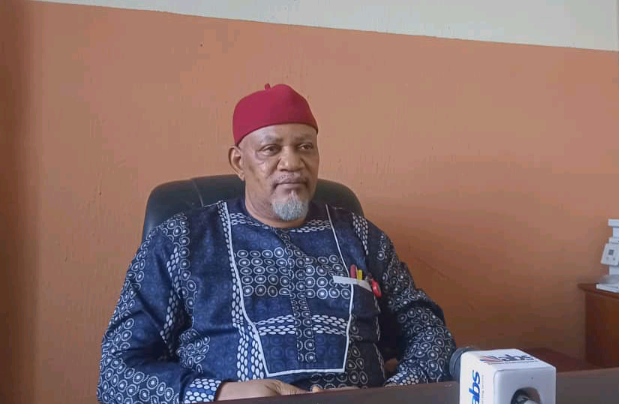 Anthony Ifeanya, Hon. Commissioner for Petroleum and Mineral Resources, Anambra State. (Credit: Google/The Wills
Anthony Ifeanya, Hon. Commissioner for Petroleum and Mineral Resources, Anambra State. (Credit: Google/The Wills
Section 48 of the PIA makes it mandatory for State government ministries, departments and agencies to consult and obtain permission from the NMDPRA before taking any action that will have an impact on the petroleum midstream and downstream operations.
The section states inter alia: “Any government ministry, department or agency exercising any power or function or taking any action, which may have direct impact on the midstream or downstream petroleum operations shall consult with the Authority prior to, issuing any regulation, guideline, enforcement order or directive; exercising any such power or function; or taking any such action. The Authority shall review the recommendations of the Government ministry, department or agency and communicate decision accordingly and the decision shall be complied with by the relevant Government ministry, department or agency.”
▪ Industry regulator, security not aware of off-spec diesel in circulation in Anambra
The Nigerian Midstream and Downstream Petroleum Regulatory Authority, NMDPRA, in Anambra said it is not aware of the sales of adulterated diesel in the State.
Victor Orjiakor, Controller, NMDPRA in the State, said though his office has not received complaint on the sales of suspected off-spec diesel at JEZCO station, it does usually receive such complaints.
“We get allegations, some of them come out to be true, some of them come out otherwise. This is not the first case. It’s continuous. I told you that we are doing our job. Right now our team is in the field. We are out there in the field, tomorrow we will go, next tomorrow we will still go. Everyday they are there, they come back with result, they come back with sampling (sic). So we will continue to do our work, work will not finish today.”
“If we get a complaint, we have a procedure in our sampling process to ensure that our sampling is accurate and devoid of any allegation and we follow it. We go there in the presence of the owner and key stakeholders involved and take the sample and seal it, and we take it to our laboratory and we witness the testing. If it is off-spec, we take necessary action. Our action comes in different magnitude. What we encourage is that if you have a case like that, notify us as an organisation that regulates the midstream and downstream sector. We will do our work. Don’t forget it that they did not manufacture, they must have taken it from a depot and the chain continues like that until we get to the source.”
When asked if the Authority does not carry out quality test and certification at depots, and whether it was possible for a diesel with a flashpoint of 28°C to pass quality test, he said he can’t speak on it, saying that investigating the quality of product was outside the bound of a journalist.
“I cannot say anything about that adulterated AGO because it is still an allegation. So if you have a case of adulterated AGO or any other product in this Anambra State, report it to us. You are not empowered to do that. If you have a case that borders on quality/quantity, you make a case to us, it is our responsibility. You can’t go outside your bound. You cannot do that, there is an authority that is licensed to regulate and you are not that authority. What you do as a stakeholder is to come to that authority and make that complaint, you cannot do your work and do another person’s own, you are not empowered to do so. There was killing in my village yesterday, I didn’t report it because I am not a journalist.”
When asked to confirm if the minimum flashpoint for diesel according to the NMDPRA is 66°C, Mr Orjiakor, said he will have to confirm from his colleagues in the laboratory.
He however stressed that the Authority does not compromise if any marketer is found selling off-spec products to the public, saying that punishment for such defaulter may include suspension of license.
“We must find what is wrong. If it turns out to be off-spec, then there is a penalty for that. The person has to tell us where he bought it from, then we get to the depot and depot to the vessel. Now, we need to find out at what point the contamination occurred. Sometimes, we do multiple analyses depending on the case, because this test we do is also based on precision. We have some human error, we have some technical error, we have margin of tolerance. We can carry out another test. Technically, we have a procedure depending on the degree of the matter that is dependable, certified and acceptable. We don’t compromise, because we don’t even have power to compromise. We do the analysis, maybe if you are in doubt we take it to another laboratory. We have cases where we stopped operations, suspend license, all those things are contained in our Act.”
Orjiakor said there was no accredited laboratories for the testing of petroleum products in the South-East, his office usually takes sample to Calabar, Cross River State.
▪ Anambra State Police Command
When contacted for comment on Thursday 19th January, the Police Public Relations Officer, Anambra State Command, Ikenga Tochukwu, refused comment on the issue, saying there is no preliminary investigation on the matter.
“I can’t comment on that because I’m not aware of any preliminary investigation on the matter.”
The Dune however gathered later in the month that the company repairing police armoured personnel vehicles, Sonbroson Services Limited, had petitioned the Commissioner of Police in the State over the sales of suspected off-spec diesel by JEZCO Oil Nigeria Limited.
▪ Anambra State Government will not condone sales of off-spec product
The Commissioner for Petroleum and Mineral Resources in Anambra State, Barr Anthony Ifeanya, said the State government will not condone any marketer selling off-spec petroleum products to the public.
He stated this in is office saying, “nobody will see what is wrong in the State and close his eyes.” The compromise of quality and damage to public property “cannot be condoned.”
Ifeanya said his office will work with NMDPRA to ensure effective monitoring of quality of petroleum products sold in the State.
▪ Consumer Protection Commission
The South-East zonal office of the Federal Competition and Consumer Protection Commission (FCCPC), said it has not received complaints from consumers in Anambra State on the issue.
Though the Deputy Director, Consumer Education at the office, Nwafor Izunna, insisted that he cannot speak to journalist except he is authorized by the head office, said FCCPC exists to protect consumer’s interest, and Nigerians should always speak out about their experiences with products and sellers.
He said the FCCPC offers completely free services and will treat any complaint promptly within 1-47 days.
“Nigerians should speak out. The ‘I don’t care attitude’ shown by many consumers is not helping Nigerians have compact services. The essence of reporting cases to us is not to spoil anyone’s business, it is to ensure that consumer’s interests and well-being are protected. FCCPC is here for Nigerians, if you bring a report to us, we treat it free of charge.”
“We have done a lot of sensitization using the conventional media. We use local languages when we go out to markets and churches for awareness campaigns, we have formed consumer clusters in communities and churches here in Anambra all in a bid to promote consumer’s right and encourage them to exercise the right.”
The FCCPC has a functional and user-friendly website, call centres in the six geopolitical zones and Abuja, and an active presence on social media platforms including Twitter, Facebook and Instagram. On its website, www.fccpc.gov.ng , there are platforms for filing and tracking a complaint, reporting a violation, among other services. The call center number for the South-East zonal office is 0803-412-4060.







